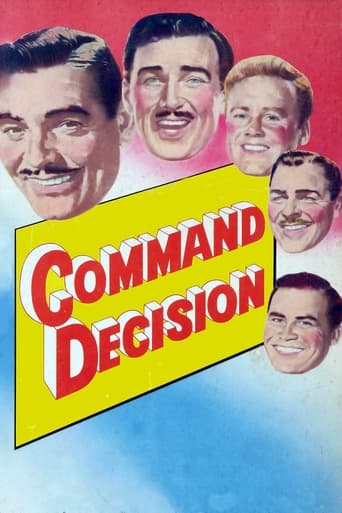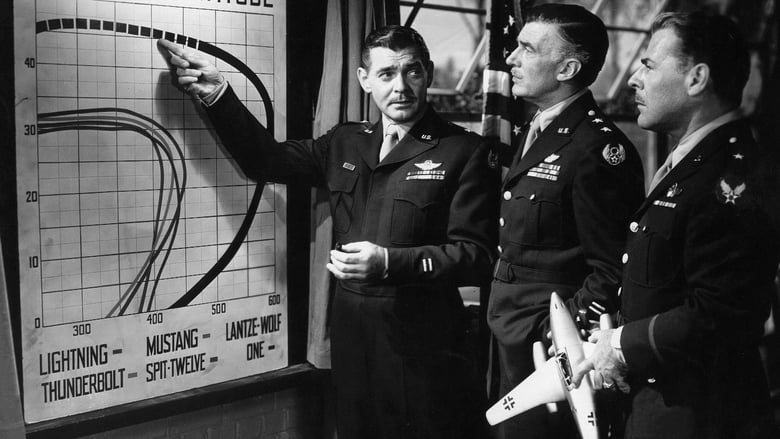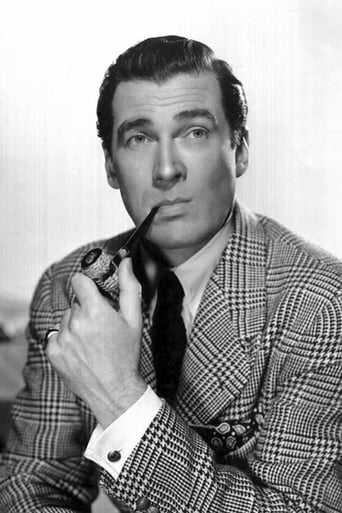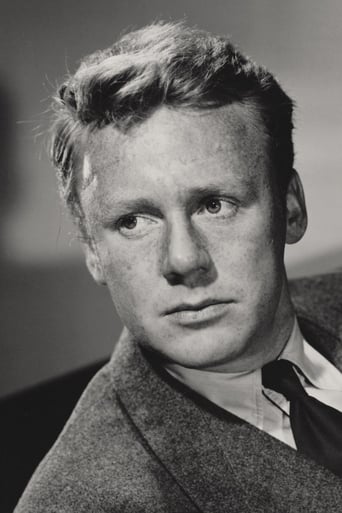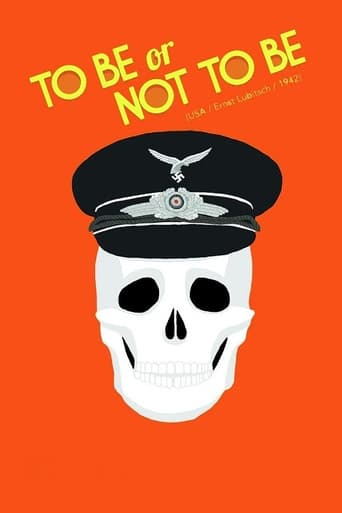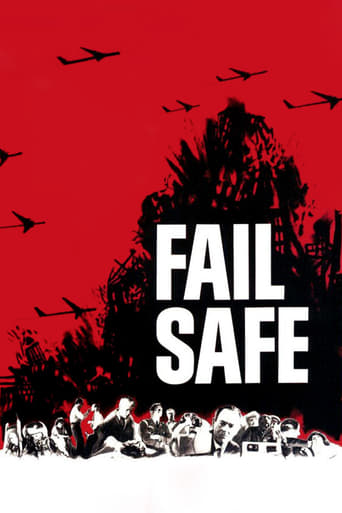Command Decision (1948)
High-ranking officers struggle with the decision to prioritize bombing German factories producing new jet fighters over the extremely high casualties the mission will cost.
Watch Trailer
Cast
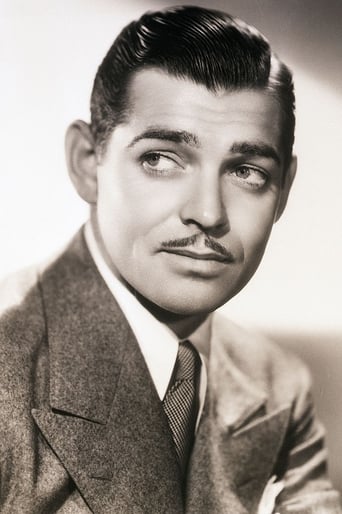


Similar titles
Reviews
Thanks for the memories!
Absolutely Fantastic
The film creates a perfect balance between action and depth of basic needs, in the midst of an infertile atmosphere.
This is a coming of age storyline that you've seen in one form or another for decades. It takes a truly unique voice to make yet another one worth watching.
Command Decision is my favourite film in the wasteland of mediocrity that is Clark Gable's post war career; a period which only had a few highlights. The opening stock footage is the only action seen in the film as Command Decision is a movie consisting of wordy drama; quality actors delivering quality performances.Gable himself was a bombardier during the war and spearheaded the production of Command Decision thus it must have been something he had real passion for. The role of Brig. Gen. K.C. "Casey" Dennis is not cocky Gable as he often portrayed, nor does he have a leading lady to play off. Dennis is a man under strain which you can clearly see on his face; in order to fight Nazis he must first fight his superiors, politicians as well as dealing with the press and even attending to matters such as farmers complaining about early morning take offs frightening their cows ("When did I ever get the impression this war was against the axis?"). Above all he is a man with life and death on his hands and even the outcome of the war. He may not see the battlefield but he still has an unpleasant job to do. Walter Pidgeon however gives my favourite performance in the film as Major General Kane with his monologue in which he speaks off how the US Air Force struggled for years in an effort to get it equipped and running is the highlight of the movie. It is four minutes long, there are no cuts with actors interacting with Pidgeon along the way while he moves around the room with the camera following him; hair raising acting.Van Johnson gives the film its comic relief to contrast the serious, downbeat nature of the film. As Sgt. Evans he rarely takes himself totally seriously from his wisecracks to sitting at Dennis' desk when he's not around. Johnson was often case in military roles and it's not hard to see why; he was a boy next door with the essence of an eager young patriot. However Evans' inability to take himself seriously could show a cynical side to his character as someone who doesn't have much faith in the war machine; in fact the one scene in which he does act in a more serious manner is the moment in which he praises Dennis and shakes his hand after Dennis lambasts Edward Arnold's congressman who criticises him for recklessly causing heavy loss of life. Command Decision is a movie which covers a lot making it one worth viewing more than once in order to take it all in. Giving the film the benefit of the doubt in its accuracy, it's an educational experience. Compared to a film like The Dawn Patrol (original and its remake) there is a world of difference in flight commanding between the world wars; much more high tech, bureaucratic and on a larger, industrial like scale.Like the flight commander in The Dawn Patrol, Dennis gets hounded for the decisions he makes which leads to the message I ultimately take from Command Decision. Dennis' decisions are causing a heavy loss of life of US airmen but the success of these missions to destroy the Nazi's secret weapon in Schweinhaven (not a real place) could change the outcome of the war and save a greater number of lives in the long term. You can't afford to appear virtuous and care only for the immediate loss of life in order to get results. However as Kane knows, without a good publicity and political support there not be much of an air force and how do you do that is your actions appear reckless to the laymen; a real catch-22.
Even in the middle of war, politics can gum up the works. Military people are told to fight a war, and then are second-guessed by the very same people who told them to fight. That is not fair. This movies dramatizes how politics directly influences command decisions. The movie portrays the top brass as being sycophants who are terrified of disappointing those who fund their projects and career, and what happens if one of the generals refuse to kowtow. This has nothing to do with legitimate civilian oversight of military operations. Rather, it is about how the military is rendered subordinate to politicians who are more interested in making political points at the expense of the military than actually winning the war. Edward Arnold gives a command performance as a US senator who uses his position to try to bully the military to the point that it poses a direct threat to military operations already decided upon at the highest levels. Clark Gable gives one his stronger performances as the general who maintains his integrity and belief in the mission. To commission soldiers to fight a war and then rag them for doing exactly what they have been ordered to do is the height of hypocrisy. Yet, sadly, it is all too true.
It's a little reminiscent of "Twelve O'Clock High," which came out at about the same time. Both focus on a commander who must order near-suicidal bombing missions in B-17s over Germany. Both examine the role of the commander who must sacrifice his men in pursuit of a loftier goal.But "Twelve O'clock High" is situated in an earlier stage of the bombing campaign against Germany, when there were simply not enough airplanes, and not the right kind, to do the job -- and the job was to prove the effectiveness of daylight precision bombing, as opposed to the British practice of night area bombing. It was a genuine historical issue. British losses were awful, and so were ours, leading to our suspension of daylight bombing until escort fighters were available.In "Command Decision", the period is later and incidents from the earlier period are mixed up with later problems. The issue now is not daylight precision bombing but the demolition of the factories in Schweinhaven and elsewhere (made-up names) that are producing a Messerschmidt jet that can out fly anything we have in the air. The new German airplane is given a name in this movie -- I forget exactly what it is, but it's something like "bomber shooter" -- that doesn't do the Luftwaffe credit for its imagination. In reality it was called "Die Schwalbe," the swallow. Nice irony, eh? The British and the Germans were always ahead of us when it came to nicknames. A swallow is a harmless bird. A B-24 was "a furniture van" to the Germans.Anyhow this movie, as good as it is -- and it's pretty good, focuses on command decisions, namely those made by General Clark Gable. He's forced to do what Gregory Peck does in "Twelve O'Clock High," bear down on his men and defy the higher-ups. The higher-ups are represented by visiting congressmen, including Edward Arnold, the eternal blow hard. There are other familiar stereotypical figures -- the wisecracking, all-knowing, down-to-earth sergeant (Van Johnson), the general from Washington who has his manhood squeezed in a vice between inexorable politics and his genuine desire to see the job done. Somebody's heroic nephew, all gung ho, who dies in the last raid after his son is born."Twelve O'Clock High" is probably a better movie, if only because it has a scene of combat at the end. This one is all stage bound. That's not necessarily bad, but it's treated as a platform for speeches. It's talky. "Why, Casey, do you realize how long I've fought for more bombers. Say, I backed bombing when it was a road to Siberia." That sort of thing.And there's another weakness. Only one person in this film changes -- Brian Donleavy as the general who replaces the fired Clark Gable. In "Twelve O'Clock High," Peck's general changes the entire outfit, even at the cost of his own sanity, and it's a pleasure to see the unit evolve.These weaknesses don't add up to that much. And, for anyone who wants to subject himself to the agony of thought, it's an instructive movie. Germany was an organized, territorial, uniformed opponent who had declared war on us and finally signed articles of surrender. The war ended -- with finality. The sacrifice of so many lives was not only justified, it was necessary. Is that reasoning still justified in a post-nuclear environment? What does the word "war" mean?
In a larger sense "Command Decision" is not really a war movie but a film about the responsibility of command and leadership. It is one of the few films that effectively explores these topics; and belongs right up there with the original "Flight of the Phoenix" and "The Red Tent". Not having the visual power of those two films (the limited combat/action scenes are almost entirely stock footage), it must focus more narrowly on the human complications arising from the responsibility of command. The contradiction being that while a leader must cease to be human, no one who can do this is fit to be a leader. Adapted from a stage play, "Command Decision" suffers from a fair amount of "long-windedness". Fortunately the most long-winded character (Major General Kane-played by Walter Pigeon), is well written and has many substantial things to convey. Much like his character in "Forbidden Planet", Pigeon is tasked with inserting historical and philosophical details into the story, and his commanding screen presence makes him ideal for this purpose.Brigadier General K.C. Dennis (Clark Gable) has the most screen time and most challenging role, as his character is the guy stuck between a rock and a hard place. He is accountable for making the hard decisions that send his men off to die, but has a fragile authority dependent on how much independence his superiors are allowing him at a particular point in time. Gable does fine in this part, probably his best totally "serious" performance. Although the film takes pains to use the German high command to illustrate examples of bad leadership, it is easy to infer that the same mindset applies to the Allies. With many military leaders distorting events to cover their own ass and willing to sacrifice men for their own career advancement and personal ideology.The premise of the film is the Air Corps discovery that the Germans have developed the first jet combat plane. Based on the real life Messerschmitt Me-262 (shown as a model in the film and in some archival footage), it is called the "Lantze-Wolf" here and considered so effective as a fighter aircraft that full production would allow the Luftwaffe to regain air supremacy over Europe. The planes are being assembled in three cities deep in Germany. The only hope to delay their full production is "Operation Stitch" (named for its goal of gaining a stitch in time), a plan to attack these sites through dangerous daylight bombing raids. Dangerous because they will be heavily defended and because the bombers will have to go the final hundred miles without fighter escort-since the America fighters do not have the range to reach and return from the target. This type of daylight bombing was called precision bombing because the bomb-site was more effective with better visibility and a lower altitude. The alternative was safer but less accurate saturation bombing at night (insert Dresden here). General Dennis must decide whether to start the operation, and then when the bombers take substantial punishment he must decide whether to continue in the expectation of additional high losses. The film takes certain historical liberties as only after a postwar evaluation of the actual ME-262 did anyone really understand its strategic potential (in the hands of well trained pilots) as a fighter aircraft. Until the end Hitler insisted that it be utilized almost exclusively as a bomber. Although able to carry out this alternative role, its bomb load capacity was too little for any significant impact. That the ME-262 is more a footnote to the war than a major element was due more to Hitler's decision than to any allied efforts to limit its production.Then again, what do I know? I'm only a child.

